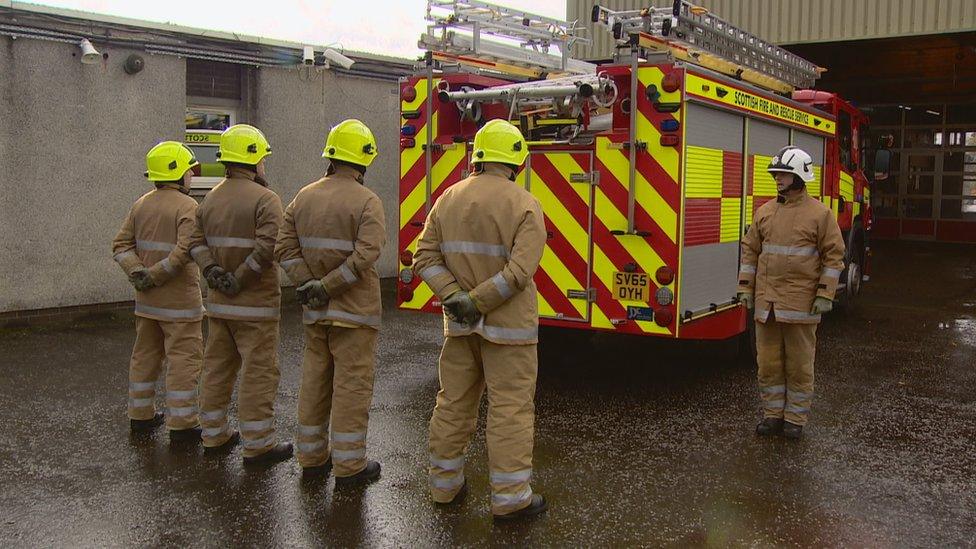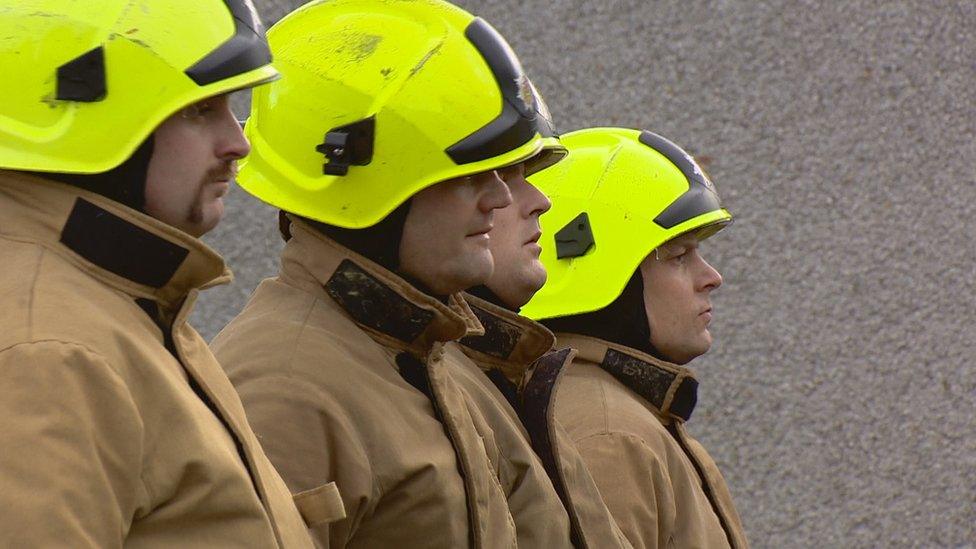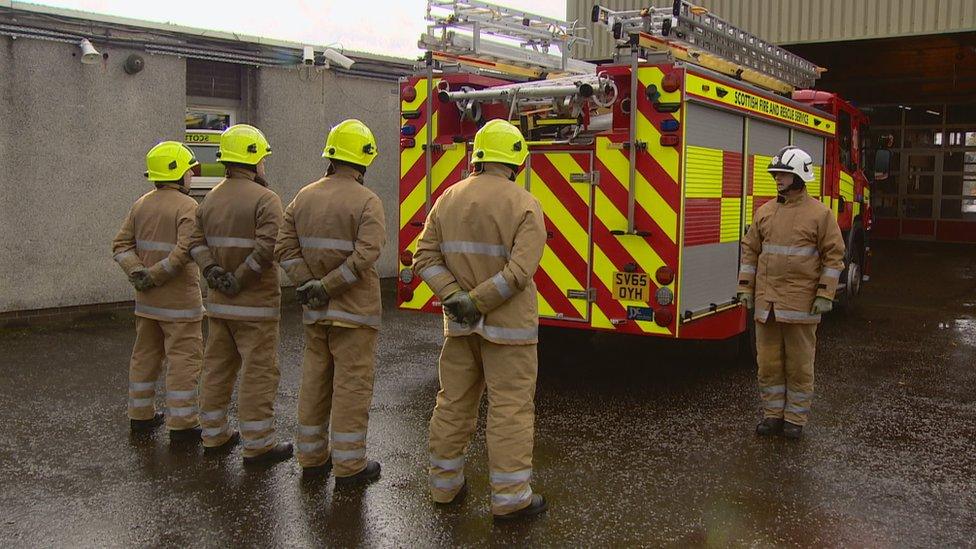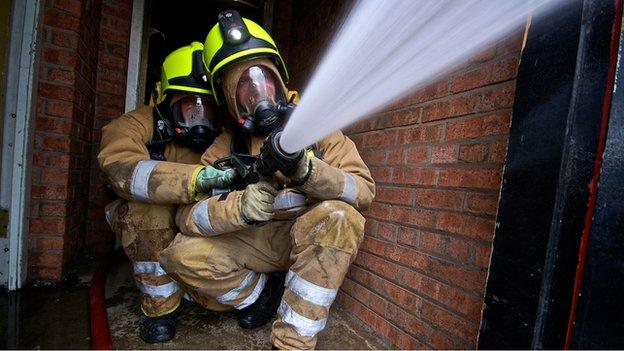Scottish firefighters offered 20% pay rise
- Published

Scotland's firefighters are being offered a pay rise of up to 20% if they agree to take on new responsibilities.
It is expected that between 200 and 300 jobs could be cut from the service as part of the deal.
Rather than a pay rise, it is being described as a new reward package for a new expanded role, tackling terrorism and providing emergency medical care.
The Fire Brigades Union Scotland said it was "wholly unacceptable" that members had been contacted directly.
In a Facebook post, it said the union had been in ongoing negotiations on standardisation of terms and conditions and received the final proposal on Monday along with a first proposal on "service transformation for uniformed employees".
It said the Scottish Fire and Rescue Service (SFRS) bypassed nationally agreed collective bargaining processes and provided details of the service transformation proposal to its members directly before it could be considered by the union's Scottish regional committee and executive council.
The amount officers get will depend on their current level of pay and special allowances.
The offer is due to be discussed by the Scottish and UK Fire Brigade Union next week.
In a letter sent to rank and file officers, Scotland's fire chief Alasdair Hay outlines proposals to increase basic pay from £29,934 to £35,800 by 2021/22.
He says the proposed new firefighter role would include emergency medical response and terrorism response.
Firefighters would also be expected to respond to environmental events, wider youth and social prevention work and inspection and enforcement responsibilities.
In their letter to officers, Mr Hay and Kirsty Darwent, chairwoman of the Scottish Fire and Rescue Service (SFRS) board, say: "For too long your pay has been eroded in real terms and we believe you deserve better."
'Completely new role'
And they rule out compulsory redundancies, insisting that the "small reduction in whole time firefighter posts" will be achieved through planned retirements.
In a statement, Dr Darwent said the fire service would now enter negotiations with staff and unions.
"This service has set out very clearly how it needs to transform to meet the significant new and emerging risks that Scotland now faces, such as severe weather-related flooding and terror attack," she said.
"We are offering to pay our firefighters more - but we are asking them to do a lot more, by taking on a completely new role to enhance the safety of the communities they serve.
"This is a proposal. We will now enter into formal negotiations with staff and unions, and believe we can reach the right outcome for our firefighters and the people of Scotland."

Fire service numbers

There were 7,834 staff employed by Scottish Fire and Rescue Service (SFRS) at 31 March 2017. This figure is 1% lower than in 2016
There are 700 fewer firefighters than 2013 when the fire service was merged
The number of fire stations in Scotland on 31 March 2017 was unchanged from 2016 at 356 stations
Two-thirds of all fire stations (240) are primarily RDS (retained duty system). These are mainly rural stations crewed by on-call, part-time fire officers
21% (74 stations) are full-time
12% (42 stations) are volunteer crewed

A Scottish government spokesman said the government had provided extra funding for the fire service.
"Much progress has been made through fire reform, improving outcomes and access to specialist facilities while protecting frontline services and keeping people safe," he said.
"In the draft budget, we have increased spending capacity of SFRS by £15.5m for 2018-19, providing £5.5m extra and ensuring they keep £10m in full from VAT costs, to invest in transformation plans.
"This is on top of the £21.7m increase in the operational budget for the fire and rescue service this year to support investment in equipment and resources."
He added: "Operational decisions on the allocation of resources are a matter for the SFRS board and chief officer, who have been exploring for some time now how best to develop the service to meet new and emerging risks, including how transformation could see SFRS do more for the people of Scotland.
"The process involves liaison with staff, partners and the public.
"The SFRS has indicated that their proposed reward package would be for a new, expanded role for firefighters, which, of course, is still to be negotiated and agreed with unions."
'Undermine consultation'
FBU Scotland said: "It is wholly unacceptable for SFRS to now ignore our FBU structures by contacting members directly stating that the offer "represents an extremely attractive proposal" without giving any specific details on that proposal as well as any details on harmonisation of terms and conditions.
"We believe this could constitute a deliberate attempt to undermine our consultation with our members.
"We therefore strongly advise members not to engage with SFRS's request in considering the service transformation proposal as the FBU have not fully discussed the impact and details of this."
Scotland's eight regional fire services were merged into a single service almost five years ago.
Since April 2013, the SFRS, which has a budget of about £260m, has lost more than 700 firefighters and been under pressure to keep costs down.
In 2015, Audit Scotland warned of a potential funding gap of £42.7m by 2019/20.
Documents seen by BBC Scotland last year revealed that fire stations were to be closed and firefighter numbers cut.
Scotland's fire chief Alasdair Hay said the service needed to be "transformed".
- Published25 October 2017

- Published21 May 2015
